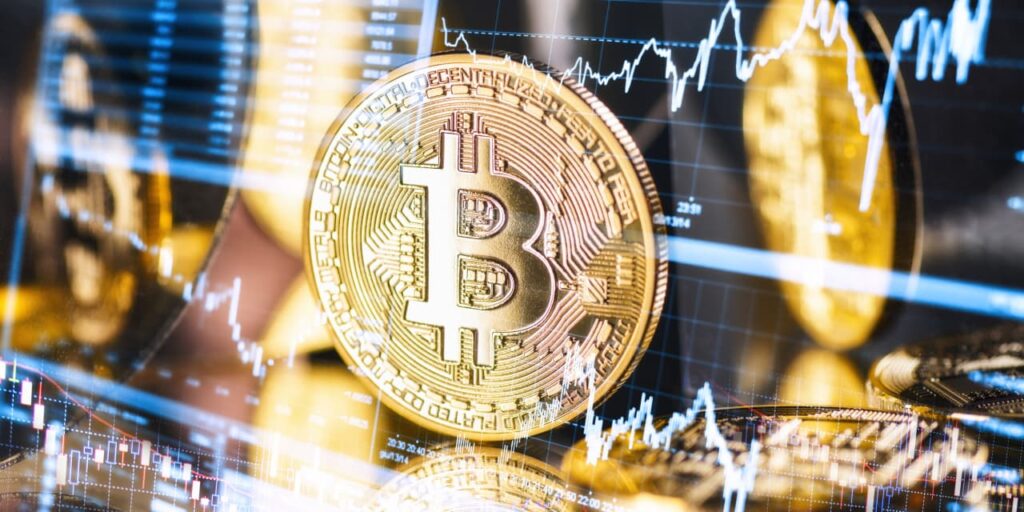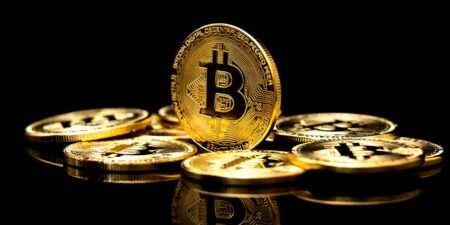The last week has been good for token investors. The
S&P 500
has dropped 1.7% amid Middle East tensions. The Barclays Aggregate Bond Index is down 1.3% as the 10-year Treasury yield hovers near 5%, a level it hadn’t crossed since 2007. But amid the tumult, Bitcoin has soared more than 9%.
The divergence has some speculating that tokens are acting as a haven, similar to how they performed during the regional bank crises in March.
“There’s more people running into a flight to quality whether that is in Treasuries, gold or crypto depending on how you think about it and I believe crypto will play that type of role as a flight to quality,” said BlackRock CEO Larry Fink in an interview on Fox Business this week.
But before starting to treat Bitcoin as a risk hedge akin to gold, investors would do well to look at the news events of the past week and consider that the token market has really just benefited from a spell of good news, rather than a regime change worth chasing.
The first positive news cycle occurred last Friday, when the Securities and Exchange Commission declined to appeal a court loss against Grayscale Investments. A court ruled that the SEC erred in denying a bid to convert the
Grayscale Bitcoin Trust
(ticker: GBTC) into an exchange-traded fund, and the agency’s decision to forego an appeal gives investors hope that the market could soon see its first Bitcoin ETF, luring tens of billions of dollars in institutional money into the space.
The second positive event occurred Thursday afternoon, when the SEC dropped part of its case against crypto firm Ripple Labs and two of its executives. Ripple Chief Legal Officer Stuart Alderoty on X called the voluntary dismissal as a “surrender,” while the company put out a news release calling it a “stunning capitulation by the government.”
Ripple’s token, called XRP, in the past 24 hours rallied 7%, while Bitcoin was up 3%. Other alt coins like Solana and Polygon also had huge run-ups.
While the news has been positive for tokens, it’s generally not an indication that investors all of a sudden have determined that Bitcoin or other tokens will play a protective role in a portfolio. Indeed, even the positive news cycle may be short-lived.
Take the Ripple decision. In 2020, the SEC sued Ripple Labs and two executives, charging them with conducting a $1.3 billion unregistered securities offering. Ripple fought the charges, and this summer a judge in the U.S. District Court for the Southern District of New York gave Ripple a partial victory, ruling that XRP wasn’t in and of itself a security.
The win was seen potentially to hamstring separate cases that the SEC has brought against trading platforms
Coinbase Global
(COIN) and Binance, in part because the agency is arguing that those platforms were facilitating securities transactions. If trades in XRP, and tokens like it aren’t securities transactions, the SEC might not have jurisdiction to go after the companies.
The SEC asked for permission to appeal the Ripple dismissal before finishing the rest of the case, but the judge denied that attempt earlier this month.
Pursuing the charges against the Ripple executives could have drawn out the case for another year. By voluntarily dismissing the charges against the executives, the SEC might be able to appeal the decision that matters the most to the crypto industry—whether tokens are securities—much sooner.
The SEC declined to comment.
All that’s to say that even some of news propelling token prices might not be the bullish signals they’re cracked up to be. Investors should be wary at misinterpreting a news cycle as a wholesale shift in how to treat tokens in a portfolio.
Write to Joe Light at [email protected]
Read the full article here













